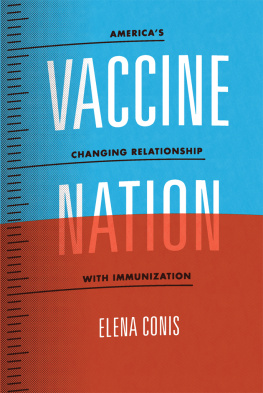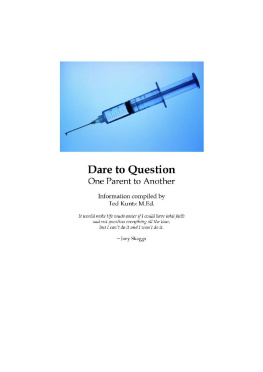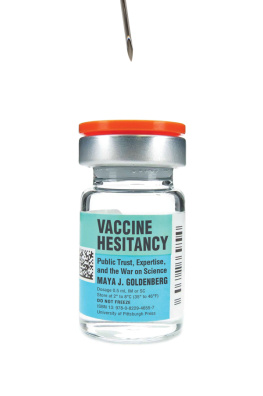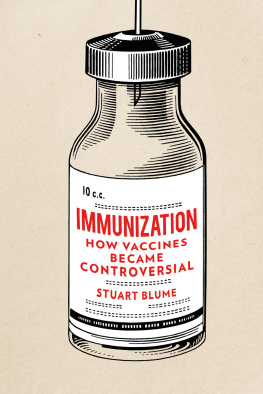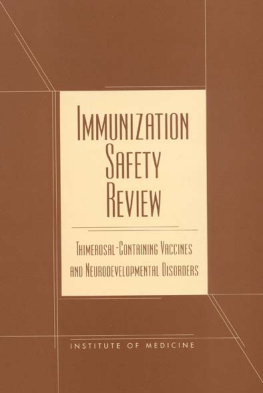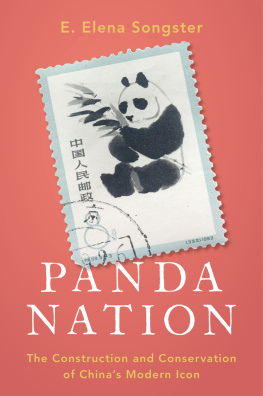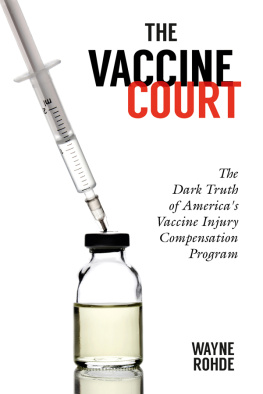Elena Conis - Vaccine Nation: Americas Changing Relationship with Immunization
Here you can read online Elena Conis - Vaccine Nation: Americas Changing Relationship with Immunization full text of the book (entire story) in english for free. Download pdf and epub, get meaning, cover and reviews about this ebook. year: 2014, publisher: University of Chicago Press, genre: Politics. Description of the work, (preface) as well as reviews are available. Best literature library LitArk.com created for fans of good reading and offers a wide selection of genres:
Romance novel
Science fiction
Adventure
Detective
Science
History
Home and family
Prose
Art
Politics
Computer
Non-fiction
Religion
Business
Children
Humor
Choose a favorite category and find really read worthwhile books. Enjoy immersion in the world of imagination, feel the emotions of the characters or learn something new for yourself, make an fascinating discovery.
- Book:Vaccine Nation: Americas Changing Relationship with Immunization
- Author:
- Publisher:University of Chicago Press
- Genre:
- Year:2014
- Rating:3 / 5
- Favourites:Add to favourites
- Your mark:
- 60
- 1
- 2
- 3
- 4
- 5
Vaccine Nation: Americas Changing Relationship with Immunization: summary, description and annotation
We offer to read an annotation, description, summary or preface (depends on what the author of the book "Vaccine Nation: Americas Changing Relationship with Immunization" wrote himself). If you haven't found the necessary information about the book — write in the comments, we will try to find it.
Elena Conis: author's other books
Who wrote Vaccine Nation: Americas Changing Relationship with Immunization? Find out the surname, the name of the author of the book and a list of all author's works by series.
Vaccine Nation: Americas Changing Relationship with Immunization — read online for free the complete book (whole text) full work
Below is the text of the book, divided by pages. System saving the place of the last page read, allows you to conveniently read the book "Vaccine Nation: Americas Changing Relationship with Immunization" online for free, without having to search again every time where you left off. Put a bookmark, and you can go to the page where you finished reading at any time.
Font size:
Interval:
Bookmark:
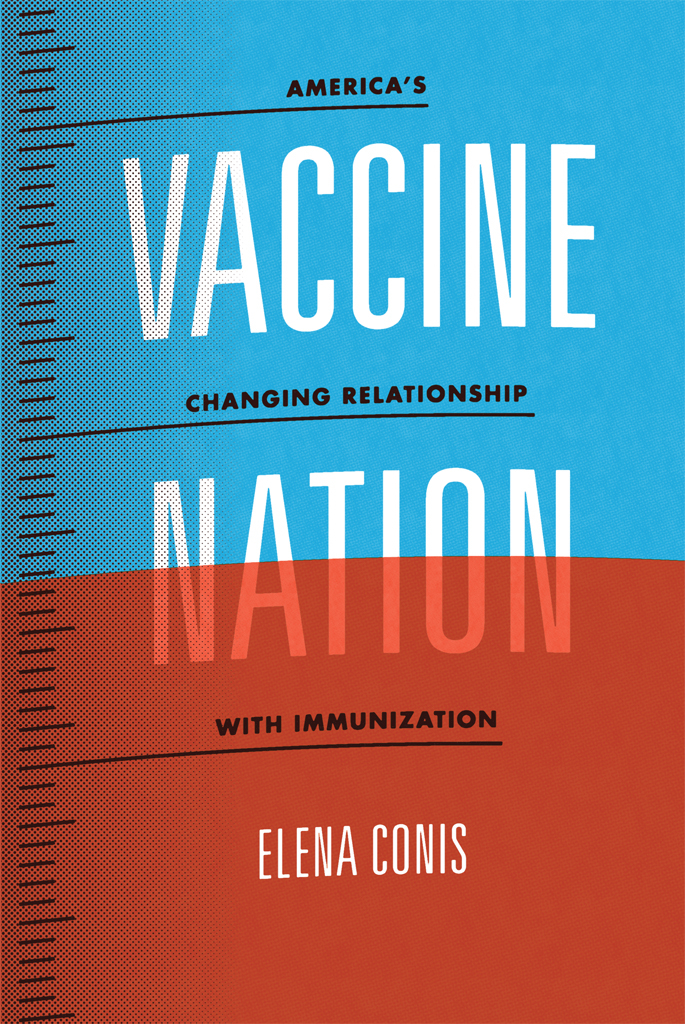
VACCINE NATION
VACCINE NATION
AMERICAS CHANGING RELATIONSHIP WITH IMMUNIZATION
ELENA CONIS
The University of Chicago Press
Chicago and London
E LENA C ONIS is assistant professor of history at Emory University.
The University of Chicago Press, Chicago 60637
The University of Chicago Press, Ltd., London
2015 by The University of Chicago
All rights reserved. Published 2015.
Printed in the United States of America
24 23 22 21 20 19 18 17 16 15 1 2 3 4 5
ISBN -13: 978-0-226-92376-5 (cloth)
ISBN -13: 978-0-226-92377-2 (e-book)
DOI : 10.7208/chicago/9780226923772.001.0001
Library of Congress Cataloging-in-Publication Data
Conis, Elena, author.
Vaccine nation: Americas changing relationship with immunization / Elena Conis.
pages cm
Includes bibliographical references and index.
ISBN 978-0-226-92376-5 (cloth : alkaline paper)
ISBN 978-0-226-92377-2 (e-book)
1. VaccinationUnited StatesHistory20th century. I. Title.
RA638.C66 2015
614.470973dc23 2014009846
Portions of appeared in the Journal of Medical Humanities: Do We Really Need Hepatitis B on the Second Day of Life?: Vaccination Mandates and Shifting Representations of Hepatitis B, Journal of Medical Humanities 32, no. 2 (2011): 15566.
A version of previously appeared in the Bulletin of the History of Medicine. Copyright 2013 The Johns Hopkins University Press: A Mothers Responsibility: Women, Medicine, and the Rise of Contemporary Vaccine Skepticism in the U.S., Bulletin of the History of Medicine 87, no. 3 (2013): 40735.
This paper meets the requirements of ANSI / NISO Z39.48-1992 (Permanence of Paper).
For JVR
CONTENTS
At the turn of the new millennium, childhood vaccines were constantly in the news. A new vaccine against rotavirus was recalled because it caused a severe bowel disorder. A long-used vaccine preservative was banned because it exposed children to the toxic metal mercury. Congressional hearings investigated the safety of the hepatitis B vaccine, following news reports that it caused multiple sclerosis and autoimmune disorders. A growing number of parents worried that the vaccine against measles, mumps, and rubella was behind rising rates of autism. And a new vaccine, against human papillomavirus (HPV), sparked a firestorm of debate when lawmakers attempted to require it for sixth-grade girls. As these episodes unfolded, blogs, message boards, and best-selling books buzzed with advice about how to circumvent vaccine requirements and undo feared damage caused by vaccines. Celebrities spoke out against vaccines on talk shows and the nightly news. Angry parents marched on Washington. Even presidential hopefuls weighed in from the 2012 campaign trail. Vaccines for children had become one of the biggest controversies of the day.
In response, medical and health experts did all they could to assure Americans that vaccines were safe. The nations prestigious Institute of Medicine convened expert panels that reviewed and confirmed the safety of vaccines against hepatitis B and measles, mumps, and rubella. Scientists launched massive studies that examined the causes of autism and exonerated vaccines. Physicians and health officials took to the airwaves to remind parents that the diseases prevented by vaccines were both real and far worse than the exceedingly rareand frequently unprovenrisks increasingly attributed to vaccines.
But such reassurances may well have been beside the point. For the larger debate over vaccination that took place in the early 2000s wasnt just about vaccine risks. At a deeper level, it was a debate about the role of children in our society, our health care politics, gender relations, chronic disease risks, and more. Vaccine controversies may have grabbed Americans attention at the start of the twenty-first century, but the broad acceptance of vaccination deserved just as much scrutiny. For the controversies were just one small piece of the much larger, more complicated, and less-examined story of the rise of childhood vaccination in modern times.
This book follows that story from the 1960s to today, in order to answer two questions: How did we come to place such importance on the mass vaccination of children against such a varied array of infections over the last half century? And why did vaccination become so contentious as the new millennium began? The story begins in the 1960s because thats when a new era of vaccination dawned.and immigration worries, to name just a fewhelped prop up vaccine acceptance, as the chapters in this book reveal. If the stories herein reveal just one thing, it is that we have never vaccinated for strictly medical reasons. Vaccination was, and is, thoroughly infused with our politics, our social values, and our cultural norms. By acknowledging and understanding the divergent reasons why weve vaccinated in the past, however, we just may ensure the continued success of vaccination in the future.
VACCINATION BEFORE THE SIXTIES
Before the 1960sfrom the advent of the first vaccine against smallpox at the turn of the nineteenth century up to the middle of the twentieth centuryvaccination in the United States was typically an individual, local, and reactive affair. Parents vaccinated children to protect them from feared diseases. Towns, cities, and states vaccinated their citizens to prevent epidemics. Often they did so because an epidemic loomed in a neighboring region or port. Local government involvement in vaccination was patchy and usually sporadic. And the federal government, on the whole, had little to nothing to do with the local and individual civilian matters of who was vaccinated, against which diseases, and when or how they received their vaccines.
Because vaccination protected both individuals and communities from disease, however, it was both a private activity and a public one. Over the first half of the twentieth century, as historian James Colgrove has shown, cities, states, and the federal government increasingly invested in vaccination in pursuit of its community benefits, and state power over vaccination expanded.
By then, the first vaccine, against smallpox, had been joined by vaccines against diphtheria and tetanus, and scientists began to amass a wealth of evidence in favor of enforcing vaccination outside the context
Over time, the sum total of these events and observations gradually elevated the position of vaccination in American science, policy, and society. But the rise of vaccination in this period was neither entirely smooth nor inexorable, and compulsory vaccination in particular faced challenges. Anti-vaccination groups, first mobilized in the late nineteenth century, decried vaccination as inherently dangerous and compulsory vaccination as un-American for its violation of individual freedoms. During the Progressive Era, anti-vaccinationists tackled local and state compulsory vaccination statutes and managed to win a handful of state bans on such laws. The nations economy, too, posed its own challenges to the expansion of vaccination: the Depression diminished the capacity of local governments to launch vaccination campaigns and resulted in declining use of medical services overall.
That contraction would turn out to be short-lived, however. Scientific and popular support for vaccination swelled to an unprecedented extent during the Second World War. Thanks to vaccines, wartime news reports declared, American troops were safe from tetanus, pneumonia, Rocky Mountain spotted fever, yellow fever, and more. Vaccines, in short, were subtly but deftly woven into the narrative Americans toldand were toldabout how scientific and technological prowess had made the United States the leader of the free world.
Font size:
Interval:
Bookmark:
Similar books «Vaccine Nation: Americas Changing Relationship with Immunization»
Look at similar books to Vaccine Nation: Americas Changing Relationship with Immunization. We have selected literature similar in name and meaning in the hope of providing readers with more options to find new, interesting, not yet read works.
Discussion, reviews of the book Vaccine Nation: Americas Changing Relationship with Immunization and just readers' own opinions. Leave your comments, write what you think about the work, its meaning or the main characters. Specify what exactly you liked and what you didn't like, and why you think so.

